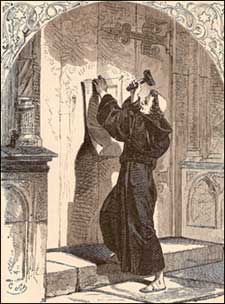
A good friend of mine has recently been having some theological discussions with some Roman Catholics. These aren't your run of the mill Catholics, these seem to care a good deal about doctrine (oxymoron?). One of the points that these Catholics pressed was that in all reality the Bible is not the only authority on which we are to base our doctrine. I frankly have never heard this pushed so blatantly, generally I have merely heard quibbles about how we cannot interpret the bible on our own, so therefore we need the saints and popes (Catholic Church's tradition) to interpret for us. Thus, this is not an outright denial of sola scriptura but a kind of sidestep. However, these guys are a bit more militant and there argument against sola scriptura would logically go as follows:
(1) Protestants hold to X (The doctrine that the scriptures alone are to be authoritative.)
(2) X is not found in the scriptures.
.:(3) Therefore X is self refuting.
This is the core of the challenge against sola scriptura, namely that it takes an extra-biblical dogma to establish (1), which says only the bible gives authority to doctrine. The above argument is valid. Yet, its presuppositions may not be sound. So if sola scriptura is true, the place to challenge this logical argument is point (2). From what I have been looking at on the net this seems to be the starting point devout Catholics make to challenge sola scriptura, to read an example check
this out.
Does the Bible Teach Sola Scriptura?A.A. Hodge lays out a good outline of a response that I will work from to answer these challenges as he writes:
"
1st. The Scriptures always speak in the name of God, and command faith and obedience.
2nd. Christ and his apostles always refer to the written Scriptures, then existing, as authority, and to no other rule of faith whatsoever.--Luke 16:29; 10:26; John 5:39; Rom. 4:3;2 Tim. 3:15.
3rd. The Bereans are commended for bringing all questions, even apostolic teaching, to this test.--Acts 17:11; see also Isa. 8:16.
4th. Christ rebukes the Pharisees for adding to and perverting the Scriptures.--Matt. 15:7-9; Mark 7:5-8; see also Rev. 22:18, 19, and Deut. 4:2; 12:32; Josh. 1:7."
*(I think progressively with each point it Rome's error becomes more flagrent)*
1st) The scripture clearly displays God alone as having the right to command men. A case and point testimony of failure to conform to this is found in 1 Kings 13, where a prophet is given specific instructions on how he is to travel to deliver his message (He is specifically commanded to take up no lodging v.9) However, another prophet catches wind that this man is of God and begins to persuade this man to lodge with him even saying to him that God spoke to him that He (God) basically changed His mind and it was now ok to take up lodging. Upon finally accepting the invitation the word of the Lord comes to the deceptive prophet, which condemns the 1st for yielding to the invitations. Later the first prophet is killed by a lion on the road for his disobedience to the word of the Lord.
The point I am driving at is that God expects His word, and His commands to be put above the counsel of men. The entire bible is really a "thus says the Lord" book therefore it is to be held above men's ideas and even interpretations which may err.
2nd) Christ and the apostles leaned upon the written word to support their teachings, therefore to do other than they is not only unsafe but also unwise. It is amazing to note how often Christ uses the phrase "As it is written..." Christ, who really is the author of all scripture, leaned upon the authority of His own written word to give support to His teachings. The scriptures are the foundation of true hope giving teaching:
"For whatever was written in former days was written for our instruction, that through endurance and through the encouragement of the Scriptures we might have hope." (Rom 15:4)
To the scriptures do Christ and the apostles point not only for support of their own teachings but, also for the believer’s instruction (doctrine) and hope.
3rd) It is of great note that unlike the Catholic churches dogma's which are viewed as the final authority and unquestionable, Paul basically says to the Bereans: "Good job, you didn't just take my word for it when I presented doctrine to you but you searched the scriptures." (Acts 17:11) Thus, Paul in

commending the Bereans for this act is really supporting sola scriptura (though he did not give it that name), for if a teaching does not line up with scripture it is not to be received. If even the apostle's teaching was to be put to the scripture test how much more that of Popes and councils? Also, Paul writes to Timothy about what scripture is and how scripture is to be used:
"All Scripture is breathed out by God and profitable for doctrine, for reproof, for correction, and for training in righteousness, that the man of God may be competent, equipped for every good work.” (2 Tim 3:16-17)
If we are going to have right doctrine, and reproof, correct, and train in righteousness,
if we are going to do any of these things which Paul mentions here it is to be based upon scripture, scripture is to be our guide. I think the only way a denier of sola scriptura can avoid the clear point of 2 Tim 3:16 is to focus on "profitable". Also, scripture is for the "man of God" not some intellectual elite, the scriptures are to equip every Christian.
4th) Hodge lastly addresses adding to scripture which is forbidden in scripture. Christ says:
"
You hypocrites! Well did Isaiah prophesy of you, when he said: "'This people honors me with their lips, but their heart is far from me;in vain do they worship me, teaching as doctrines the commandments of men.'" (Mat 15:7-9) also "
You leave the commandment of God and hold to the tradition of men." (Mark 7:8)
Here we see a charge Christ brings against the Pharisees (One based upon scripture!) that they are adding to the word the commandments of men. Now almost exactly like the Pharisees Rome would say we are not "adding to" scripture, but rather interpreting for the common man. But that is really one and the same. The Pharisees (Like Rome) also did not add texts to the bible they merely interpreted the bible for the people, and taught that interpretation. Christ calls this teaching the commandments of men, and though the bible itself was not altered, the "interpretations" of men have come to be on par with the word. It seems like the passage in Mark really flies right in the face of the Roman view of "Tradition" as some sort of authority to how we form doctrine. Christ clearly seems to be saying: "Not tradition, but the scriptures", and "Not commandments of men, but the scriptures."
Sadly, it seems that the Catholic church clearly does hold tradition on equal level as the scripture, if not even higher. It doesn't take much scholarship to realize that something is amiss in Roman theology when we look at scriptures like the ones noted above. Now it also must be noted that the "tradition" Christ refers to is specifically that which is not found in scripture (or authoritative via inspiration). We know this because Paul states:
"Now we command you, brothers, in the name of our Lord Jesus Christ, that you keep away from any brother who is walking in idleness and not in accord with the tradition that you received from us." (2 Thess 3:6)
Therefore, there is a tradition handed down by the apostles that we are to stick to. How do we know this "tradition" Paul taught? Scriptures. To contrast:
"See to it that no one takes you captive by philosophy and empty deceit, according to human tradition, according to the elemental spirits of the world, and not according to Christ." (Col 2:8)
Therefore, there is the distinction (so to avoid any Roman slipperiness with the word "tradition") between traditions of men (which are extra biblical) and the traditions of the apostles which is found in the bible alone.

To summarize, it is true that the phrase "Scripture alone is the only authority which the Church is to live by" is not in the bible. However, the practice of sola scriptura is, its truth is taken for granted. This has been seen through Paul's commending the Bereans for searching the scriptures to test Paul's doctrine (Acts 17:11), citations of scripture to support doctrines taught by both Christ and His apostles, Christ's rejections of the traditions of men in place of scripture (Matt 15:7-9). Lastly, and ultimately I think, Christians are exhorted by Paul to "
guard the good deposit." (1 Tim 6:20. 2 Tim 1:14) The deposit is no doubt the teachings of the apostles given to the church as a rule, this is of course found in the NT. The deposit does not refer to Pope's rulings or councils but to the teachings of Christ and His Apostle's (at least if we are to read in context), in context this is the only thing the deposit can possibly be.
That being said, I think like Luther that it is neither safe nor wise to base our doctrine and theology on the traditions of men and self-proclaimed "apostolic" successors. I want to stick with the deposit, the sure word of God, rather than the ideas of men.





















